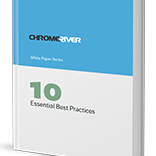
One of the most common discussions in business software procurement has been that of one-stop-shop versus best-of-breed. Choose a single vendor for all aspects of a particular function, they say, and your organization will see wide-ranging benefits, from lower costs, to smoother integration, more straightforward support resolution, and so on.
The finance and corporate travel departments aren’t immune to this dilemma, and organizations are faced with the choice of implementing solutions from specialist vendors for travel booking and expense management, or opting for a single vendor to provide all parts of the solution. At one point, it might have made sense to use the free module in the ERP system, but now you're looking for more global capabilities and unique features. If you find yourself in this situation, or may soon be looking at reviewing vendors, here are some questions you should consider before making a choice:
- Do the different parts integrate as well as claimed?
As software development can be a long and costly process, many vendors have simply acquired companies to fill gaps in their service portfolios, and then rebranded them as their own solutions. The challenge this presents is that the different solutions may well be written in a completely different software language, and therefore getting the two pieces of software to “talk” to each other could be no easier than if you selected software from different vendors. The cost of buying and then integrating these other systems, as well as the time to do so, may mean that resources which would be committed to innovation are otherwise reallocated to the process of bolting the different parts together.
Given that a seamless, integrated solution is often the main reason for choosing a one-stop-shop vendor, you should ensure that integration works just as well as it’s supposed to. Frankenstein’s monster is not what you want to end up with.
Read more: 5 Things to Consider When Choosing a Global Expense Management Solution
- Does it satisfy everybody’s need effectively?
Ideally, the finance and travel leaders will both get the best solution to fit their user populations and needs, and that these solutions work seamlessly together. In order for this to happen, organizations need to work with department heads to select solutions that best fit their individual needs. However, if a company decides to make the decision with less input from the departments, what this can often mean is that purchasing decisions aren’t based on what best fits the need for those departments, but on other internal and external factors.
A couple of issues that this throws up: first, you could end with a jack-of-all-trades-master-of-none solution, which, although it does a reasonable job of both travel booking and expense management, it doesn’t excel at either. Second, by removing the purchasing authority from those who are most impacted by the decision (and arguably those who are best-placed to make an informed decision), organizations risk disenfranchising operational departments.
- Do you want an-all-or nothing solution?
Let’s say that you don’t like the solution that was imposed on you, as it doesn’t do the job that you’d hoped it would. Should you decide that you want to replace part of your travel booking and expense management environment at some point, can you keep the part that you want, and find a new vendor for the one that you don’t? While swapping large, enterprise-wide systems such as online booking tools or expense management solutions can often present challenges, if you have a single provider for booking and expense, you may well find that you have an all-or-nothing choice – be stuck with using parts of the solution that you don’t like, or be forced to remove the whole thing and completely overhaul your entire travel booking and expense environment.
Of course, they’re hoping that you’re so daunted at the prospect of the latter, and decide to stick with them.
- Is it really easier to support?
While in theory, having a single provider means more straightforward support resolution, due to the reasons I stated in point two, this often isn’t the case. The support teams for large organizations certainly won’t have as much in-depth knowledge about the different specific parts of your solution as when you work with multiple specialized organizations. The result of this is that it could in fact take more, not less time to identify and resolve the issue.
Read more: 6 Questions Expense Management Vendors Don't Want You to Ask
- Does it cost less?
The claim from the one-stop-shops is that they can provide economies of scale, if you use multiple software vendors, you lose those economies of scale, and you’re also paying for twice the overhead on the vendors’ side. In reality, the cost of travel booking and expense management solutions – whether purchased from a single vendor of from two best-of-breed vendors – is based more on the vendors’ own pricing structures than how many vendors you work with. You need to look beyond the hype and price up the different features of the solution to get an accurate picture. Any economies of scale soon disappear when you find yourself getting nickel and dimed for every single feature, function and change that you make.
When you’re next in the market for travel booking and expense management solutions, make sure that you are addressing the needs of both finance and travel stakeholders, and that you have asked the right questions to ensure you are not selecting a one-stop-shop for the wrong reasons.
Subscribe
Latest Posts
Posts by Category
I just love the Chrome River application. I could probably sell it! Finance Administrative Coordinator Law Firm, 800 Employees
Can’t we just move year-end, so that we can roll out Chrome River sooner!? Financial Systems Director Law Firm, 300 Employees


Comments